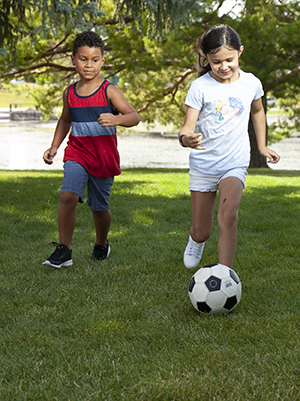For Kids: Asthma and Exercise
If you have asthma, you can enjoy sports and other physical activities if you know how to do them safely. Being active can even help your asthma. Besides being fun, exercise can make you a winner in many ways:
-
It makes your lungs healthy, so your asthma bothers you less.
-
It teaches you to stretch, reach, and move in new ways.
-
It gives you more energy.

Safety first
Your healthcare provider can tell you how to exercise safely. Here are some things to ask:
-
Should I use my inhaler before I exercise?
-
How long should I exercise each day?
-
How will I know when to slow down or rest?
-
Should I exercise when I have a cold?
With the help of your parents, talk with your gym teacher and coaches about your asthma. Make sure they understand what asthma is, how it is treated, what warning signs to look for, and how they may need to help you. Set up an “asthma signal” with them. Use the signal when you need to slow down or stop exercising. For instance, maybe you can wave to your teacher or coach.
Weather watch
-
In cold weather, breathe in through your nose, not your mouth. This warms up the air before it gets into your lungs. Try wearing a scarf to cover your nose and mouth.
-
Exercise inside if the air outside is hot, polluted, or full of pollen.
Before and after exercise
Try to follow these asthma safety tips each time you exercise:
-
Drink water or juice before, during, and after exercise.
-
If you are supposed to, use your inhaler before exercise.
-
Warm up for 5 to 10 minutes.
-
You should be able to talk while you exercise or are active. Slow down or stop if you can't.
-
Cool down for at least 5 minutes. Before you finish, stretch or just slow down.
-
Don’t give up on exercise! If your asthma still flares up, ask your healthcare provider what you should do.
Online Medical Reviewer:
Dan Brennan MD
Online Medical Reviewer:
Deborah Pedersen MD
Online Medical Reviewer:
Jessica Gotwals RN BSN MPH
Date Last Reviewed:
7/1/2022
© 2000-2025 The StayWell Company, LLC. All rights reserved. This information is not intended as a substitute for professional medical care. Always follow your healthcare professional's instructions.